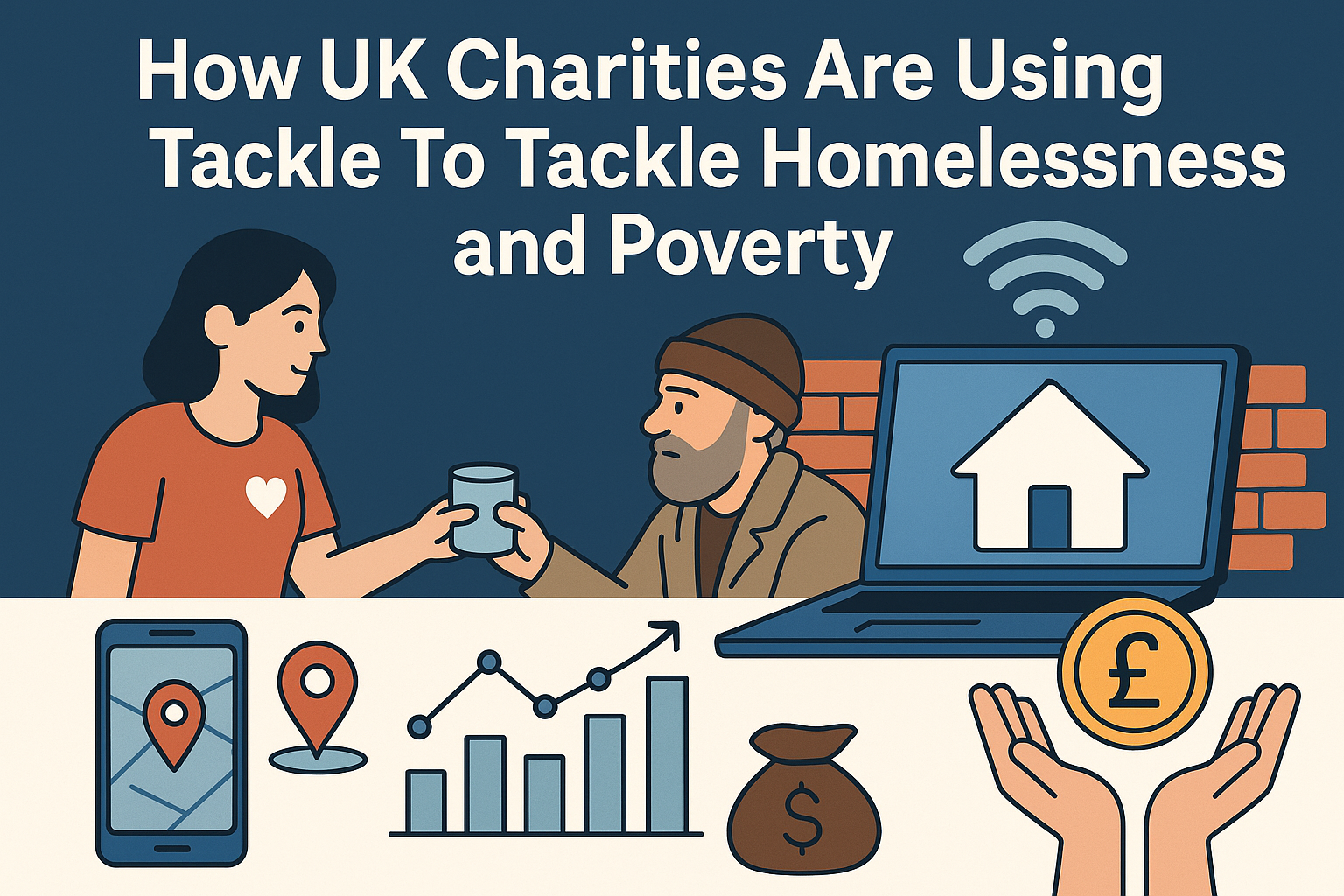How UK Charities Are Using Tech to Tackle Homelessness and Poverty

The digital revolution has transformed nearly every aspect of our lives, and the charity sector is no exception. Across the United Kingdom, charitable organizations are embracing innovative technology solutions to address some of society’s most pressing challenges. From mobile apps that connect rough sleepers with essential services to data analytics platforms that optimize food distribution, UK charities are using tech in groundbreaking ways to tackle homelessness and poverty.
This digital transformation in the charity sector represents more than just keeping up with modern trends. It’s about maximizing impact, reaching more people in need, and creating sustainable solutions that can scale effectively. As homelessness continues to rise and poverty affects millions of families across Britain, these technological innovations offer new hope and practical solutions.
The Digital Revolution in UK Charity Work
The landscape of charitable work in the United Kingdom has undergone a remarkable transformation over the past decade. Traditional methods of supporting vulnerable populations are being enhanced and sometimes completely revolutionized by digital innovation. UK charities are using tech to bridge gaps that previously seemed insurmountable, connecting those in need with resources, support, and opportunities for positive change.
This shift toward technology adoption has been accelerated by several factors, including increased smartphone penetration among all socioeconomic groups, improved internet infrastructure, and the urgent need for contactless services highlighted during the COVID-19 pandemic. Charitable organizations have recognized that to effectively serve their communities in the 21st century, they must embrace digital transformation.
The impact of this technological adoption extends far beyond simple efficiency gains. UK charities are using tech to create more personalized support systems, gather better data on community needs, and develop innovative solutions that address the root causes of homelessness and poverty rather than just treating the symptoms.
Mobile Applications: Putting Support in People’s Pockets
Connecting Rough Sleepers with Immediate Help
One of the most significant ways UK charities are using tech is through mobile applications designed specifically for homeless individuals and those at risk of homelessness. The StreetLink app, developed by Homeless Link, allows members of the public to report rough sleeping directly to local services. This simple yet powerful tool has revolutionized how outreach teams respond to people sleeping rough, enabling faster, more coordinated support.
The app works by allowing users to provide precise location data and basic information about individuals they’ve encountered sleeping rough. This information is then passed to local outreach services, who can respond with appropriate support. Since its launch, StreetLink has facilitated thousands of connections between rough sleepers and support services across England.
Comprehensive Service Directories
UK charities are using tech to create comprehensive digital directories that help homeless individuals navigate complex support systems. Apps like “Homeless Period” and “Beam” provide real-time information about available services, including shelter availability, food distribution points, healthcare services, and benefit support.
These applications often include features such as:
- GPS-enabled service location mapping
- Real-time availability updates
- Multi-language support
- Offline accessibility for when internet connection is limited
- Direct contact capabilities with service providers
The impact of these digital tools cannot be overstated. For individuals experiencing homelessness, having access to up-to-date service information through a smartphone can mean the difference between spending a night on the streets or finding safe accommodation.
Personal Case Management
Advanced mobile platforms are enabling UK charities to provide personalized case management services through technology. Apps like “MyHomeless” allow individuals to track their progress through various support programs, schedule appointments, and maintain communication with case workers even when they’re not able to visit offices in person.
These personal case management tools help maintain continuity of care, which is crucial for individuals dealing with complex issues related to homelessness and poverty. They also enable charity workers to provide more effective support by having complete, accessible records of each person’s journey and needs.
Data Analytics: Making Informed Decisions for Greater Impact
Understanding Patterns and Trends
UK charities are using tech through sophisticated data analytics to better understand homelessness and poverty patterns across different regions and demographics. Organizations like Crisis and Shelter are employing data scientists and advanced analytical tools to process vast amounts of information about service usage, housing availability, and demographic trends.
This data-driven approach enables charities to:
- Identify emerging hotspots where homelessness is increasing
- Predict seasonal fluctuations in service demand
- Understand which interventions are most effective for different population groups
- Allocate resources more efficiently based on evidence rather than assumptions
Predictive Modeling for Prevention
Perhaps most importantly, UK charities are using tech to develop predictive models that can identify individuals and families at risk of homelessness before crisis points are reached. These systems analyze multiple data points, including housing benefit claims, employment records, and past service usage, to flag households that may need preventive support.
The London Borough of Haringey has pioneered this approach, working with data analytics companies to develop algorithms that can predict homelessness risk with remarkable accuracy. This predictive capability allows early intervention services to reach families before they lose their homes, often at a fraction of the cost of providing crisis accommodation and support.
Measuring Long-term Outcomes
Data analytics also enables UK charities to move beyond simple output measurements (like number of meals served) to genuine outcome tracking (like sustainable housing achievements). Advanced customer relationship management systems combined with data analytics platforms allow organizations to follow individuals’ progress over months and years, demonstrating the long-term effectiveness of different interventions.
Online Platforms: Creating Communities of Support
Peer-to-Peer Support Networks
UK charities are using tech to create online communities where individuals with lived experience of homelessness and poverty can support each other. Platforms like “The Homeless Hub” provide safe, moderated spaces where people can share experiences, advice, and encouragement.
These digital communities serve multiple purposes:
- Reducing social isolation among vulnerable populations
- Providing peer mentorship opportunities
- Creating platforms for advocacy and voice
- Enabling knowledge sharing about available resources and services
Volunteer Coordination and Management
Digital platforms are revolutionizing how UK charities manage their volunteer workforces. Applications like “Better Impact” and “Volunteer Hub” enable organizations to:
- Match volunteers with appropriate opportunities based on skills and availability
- Provide online training and certification programs
- Track volunteer hours and impact contributions
- Coordinate large-scale volunteer events and activities
This technological approach to volunteer management has proven particularly valuable during times when in-person coordination is challenging, such as during the COVID-19 pandemic.
Fundraising Innovation
UK charities are using tech to transform fundraising through innovative online platforms that go beyond traditional donation websites. Crowdfunding platforms specifically designed for charitable causes enable organizations to run targeted campaigns for specific projects or needs.
JustGiving, GoFundMe, and similar platforms have democratized fundraising, allowing smaller charities to reach national audiences and enabling individuals to run fundraising campaigns for causes they care about. These platforms also provide valuable data about donor preferences and behavior, helping charities optimize their fundraising strategies.
Digital Food Distribution Systems
Streamlining Food Bank Operations
Food banks across the UK have embraced technology to improve their efficiency and reach. UK charities are using tech through systems like “Food Bank Manager” to track inventory, manage volunteer schedules, and coordinate with partner organizations.
Digital check-in systems have replaced paper-based processes, reducing waiting times for clients and providing better data on usage patterns. Some food banks now use QR codes to streamline the check-in process, while others employ tablet-based systems that can provide multilingual support for diverse communities.
Reducing Food Waste Through Smart Distribution
UK charities are leveraging technology to tackle food waste while addressing hunger. Apps like “OLIO” connect individuals and businesses with surplus food to those who need it, creating community-based food sharing networks.
Similarly, larger organizations use sophisticated logistics software to optimize food collection and distribution routes, ensuring that perishable items reach those in need before spoiling. This technology-driven approach has significantly increased the efficiency of food rescue operations.
Real-time Needs Assessment
Advanced food distribution systems enable UK charities to conduct real-time needs assessments, adjusting their service offerings based on current demand and available resources. Digital tracking systems can identify when certain types of food or household items are in high demand, enabling more responsive procurement and distribution strategies.
Digital Mental Health and Wellbeing Support
Online Counseling and Therapy Services
UK charities are using tech to expand access to mental health support, which is often a critical component of addressing homelessness and poverty. Organizations like Mind and Samaritans have developed online counseling platforms and chat-based support services that can reach individuals who might not be able to access traditional face-to-face services.
These digital mental health services offer several advantages:
- 24/7 availability for crisis support
- Greater anonymity for those who may feel stigmatized
- Accessibility for individuals with mobility or transportation challenges
- Cost-effective delivery of support services
Mental Health Apps and Resources
Specialized mobile applications developed by UK charities provide on-demand mental health resources, including:
- Guided meditation and mindfulness exercises
- Cognitive behavioral therapy tools
- Mood tracking capabilities
- Crisis intervention resources
- Peer support community access
These tools complement traditional mental health services and provide individuals with resources they can access whenever needed, helping to build resilience and coping skills.
Housing Technology Solutions
Property Matching Systems
UK charities are using tech to develop sophisticated property matching systems that connect individuals experiencing homelessness with appropriate accommodation options. These systems consider multiple factors including location preferences, specific needs (such as accessibility requirements), and available support services.
Organizations like Homeless Link have developed databases that enable real-time tracking of accommodation availability across different regions, helping to reduce the time individuals spend in temporary or unsuitable housing.
Digital Housing Applications
The housing application process has been streamlined through digital platforms that allow individuals to complete and submit applications online. UK charities often provide support to help people navigate these systems, sometimes through dedicated digital inclusion programs.
These online systems have made it easier for individuals to apply for housing from multiple providers simultaneously and track the progress of their applications, reducing the administrative burden and improving outcomes.
Tenancy Sustainment Technology
Beyond helping people find housing, UK charities are using tech to support tenancy sustainment through digital tools that help new tenants manage their responsibilities. Apps and online platforms provide:
- Rent payment reminders and budgeting tools
- Maintenance request systems
- Tenancy rights and responsibilities information
- Connection to local support services
These tools help reduce the risk of tenancy breakdown, which is a key factor in preventing repeat homelessness.
Skills Development and Employment Technology
Online Learning Platforms
UK charities have developed online learning platforms that enable individuals experiencing poverty to develop new skills and qualifications. These platforms often focus on digital literacy, basic education, and vocational training relevant to current job market demands.
Organizations like The Prince’s Trust have created comprehensive online learning environments that combine educational content with mentorship and career guidance, making skills development accessible to individuals who might not be able to attend traditional training programs.
Job Matching and Employment Support
Digital job matching services developed by UK charities help connect individuals with employment opportunities that match their skills and circumstances. These platforms often include features specifically designed for people who have experienced homelessness or long-term unemployment:
- Flexible scheduling options
- Support for gaps in employment history
- Connection to employer partners who provide second-chance employment
- Ongoing mentorship and support services
Financial Inclusion Technology
UK charities are using tech to address financial exclusion through digital banking solutions and financial education platforms. Apps and online services help individuals:
- Open basic bank accounts without traditional requirements
- Learn budgeting and money management skills
- Access affordable credit options
- Build credit history through alternative scoring methods
These financial inclusion initiatives are crucial for helping people transition out of poverty and maintain stable housing.
Challenges and Solutions in Charity Technology Adoption
Digital Divide Considerations
While UK charities are using tech extensively, they must also address the digital divide that affects many of the people they serve. Not everyone has access to smartphones or reliable internet connections, and digital literacy varies significantly among different populations.
Successful charitable technology initiatives address this challenge through:
- Providing device lending programs
- Offering free Wi-Fi access points
- Creating low-bandwidth versions of applications
- Maintaining non-digital service options alongside technological solutions
- Providing digital skills training and support
Data Protection and Privacy
UK charities implementing technology solutions must navigate complex data protection requirements, particularly when dealing with vulnerable populations. GDPR compliance is essential, but organizations must go beyond legal requirements to build trust with the communities they serve.
Best practices include:
- Transparent data collection and usage policies
- Secure data storage and transmission
- User control over personal information sharing
- Regular security audits and updates
- Staff training on data protection protocols
Funding Technology Initiatives
Developing and maintaining technology solutions requires significant investment, which can be challenging for charitable organizations already operating with limited resources. UK charities have found innovative funding approaches including:
- Technology-specific grants from foundations and government programs
- Corporate partnerships with technology companies
- Revenue-generating technology services that support the charity’s mission
- Collaborative development projects shared across multiple organizations
Future Innovations and Emerging Technologies
Artificial Intelligence and Machine Learning
UK charities are using tech including artificial intelligence to enhance their services in several ways. Chatbots provide 24/7 first-line support, natural language processing helps analyze feedback and identify service improvement opportunities, and machine learning algorithms optimize resource allocation and service delivery.
AI applications in the charity sector include:
- Automated triage systems that prioritize urgent cases
- Predictive analytics for resource planning
- Personalized service recommendations
- Language translation services for diverse communities
Internet of Things (IoT) Applications
Emerging IoT technologies offer new possibilities for UK charities working with homeless populations. Smart sensors can monitor the occupancy and conditions of shelters, wearable devices can provide health monitoring for vulnerable individuals, and environmental sensors can help identify safe spaces for temporary accommodation.
Blockchain and Cryptocurrency
Some forward-thinking UK charities are exploring blockchain technology for transparent donation tracking and cryptocurrency acceptance for international donations. These technologies offer potential solutions for financial transparency and global fundraising, though adoption remains in early stages.
Measuring Impact and Success
Key Performance Indicators
UK charities are using tech not just to deliver services but also to measure their impact more effectively. Digital systems enable tracking of sophisticated Key Performance Indicators (KPIs) including:
- Service user progression through support programs
- Long-term outcome achievement rates
- Cost per successful intervention
- Service user satisfaction and feedback
- Geographic reach and accessibility metrics
Evidence-Based Practice
Technology enables UK charities to build evidence bases for their interventions, contributing to sector-wide learning and best practice development. Digital data collection and analysis tools make it possible to conduct rigorous evaluations of different approaches and share findings across the sector.
Real-time Reporting and Adaptation
Digital systems allow for real-time monitoring and program adaptation, enabling UK charities to respond quickly to changing needs and circumstances. This agility has proven particularly valuable during crisis situations such as severe weather events or pandemic responses.
Conclusion: The Transformative Power of Technology in Charity Work
The ways UK charities are using tech to tackle homelessness and poverty demonstrate the transformative potential of digital innovation in the social sector. From mobile apps that connect rough sleepers with immediate help to sophisticated data analytics that prevent homelessness before it occurs, technology is enabling charitable organizations to work more effectively and reach more people than ever before.
However, the success of these technological initiatives depends not just on the sophistication of the tools themselves, but on how well they are integrated with human-centered approaches to support. The most effective programs combine technological innovation with empathy, cultural competence, and deep understanding of the communities they serve.
As UK charities continue to embrace technology, several key principles emerge for successful implementation:
- Technology should enhance rather than replace human connection
- Digital solutions must be accessible to the people they’re designed to help
- Privacy and dignity must be protected throughout all technological interactions
- Continuous learning and adaptation are essential for long-term success
Looking ahead, the potential for UK charities to use technology in addressing homelessness and poverty continues to expand. Emerging technologies like artificial intelligence, IoT devices, and blockchain offer new possibilities for innovation, while established technologies become more sophisticated and accessible.
The digital transformation of the UK charity sector represents more than just a technological upgrade – it’s a fundamental reimagining of how support services can be delivered, coordinated, and optimized. By embracing these innovations while maintaining focus on human dignity and empowerment, UK charities are using tech to build a more responsive, effective, and compassionate support system for some of society’s most vulnerable members.
The future of charitable work in the UK will undoubtedly be shaped by continued technological advancement, but the core mission remains unchanged: to provide hope, support, and pathways to better futures for those experiencing homelessness and poverty. Technology is simply providing new and more powerful tools to achieve these timeless humanitarian goals.







